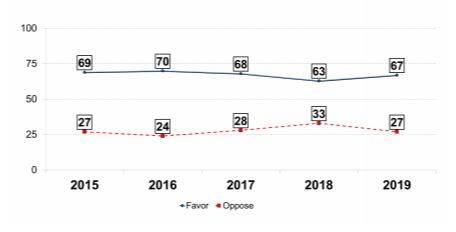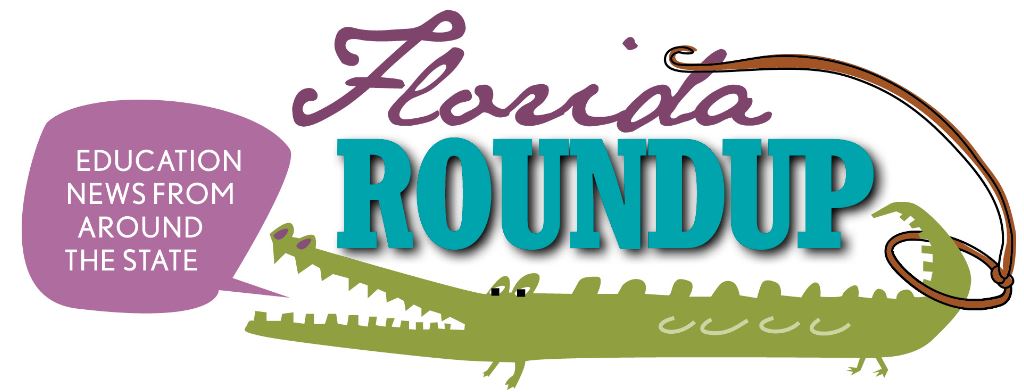A national poll conducted by the American Federation for Children shows that support for school choice stands at 67 percent, a 4 percentage-point increase from a year ago.
The poll surveyed 1,200 likely November 2020 voters to determine general support and opposition, posing the question, “Generally speaking, would you say you favor or oppose the concept of school choice?”

Annual polls by the American Federation for Children shows overall support for school choice had held steady over the past five years, in some cases growing in popularity.
Among the two-thirds of respondents who said they favor school choice, 40 percent said they strongly support it.
Survey results, released Thursday, show that support for school choice is broad across demographic categories. Latinos lead with 73 percent, followed by Whites with 68 percent and African Americans with 67 percent.
Eighty percent of Republicans support school choice, up from 75 percent in 2018, compared with 56 percent of Democrats, up from 54 percent. Sixty-nine percent of Independents voiced support for choice, up from 62 percent in 2018.
Millennials continue to be the most robust supporters of school choice in terms of age groups, with 75 percent voicing approval. Parents and grandparents, including those with children in traditional public schools, back school choice by a 3-to-1 ratio.
The survey also polled families on their preference for private versus public schools. While 58 percent of respondents said their children attend a traditional public school, only 35 percent of them said public schools are their first choice of school. Meanwhile, 59 percent of respondents said they would prefer for their child to attend a different type of school, with 29 percent citing a religious school, 18 percent a private non-religious school and 11 percent a charter school.
Almost three in five respondents selected three or more actions from a list of possible personal sacrifices they would be willing to make to send their child to a private school for free. About half said they would be willing to drive their child 25 miles each way to school; 46 percent said they would be willing to move 10 miles; and 41 percent said they would be willing to change jobs.
This year marks the fifth year that the American Federation for Children has conducted its National School Choice Poll. The survey fielded Jan. 6-10 with interviews conducted on landline and cell phones in English and Spanish. The survey had a margin of error of plus or minus 3.5 percent.

Gov. Terry McAuliffe
Virginia Gov. Terry McAuliffe vetoed a trio of school choice bills this week —including one establishing education savings accounts (ESAs) for students with special needs.
The vetoes came just a month after McAuliffe vetoed a pair of bills allowing home education students to participate in public school sports.
The education savings accounts could have been the sixth such program nationwide, the first approved by a Democratic governor, and the second private school choice program in Virginia. (The commonwealth offers a small tax credit scholarship program for low-to moderate-income students. That program launched in 2013.)
The governor provided three reasons for the veto of the education savings account legislation (House Bill 389). (more…)

Hillary Clinton’s campaign for presidency has begun and the pro- and con- sides of school choice using her campaign announcement video to advance their arguments.
Jonathan Chait delivers a real gut punch to his fellow liberals who oppose charter schools or remain romantically attached to a neighborhood-based system of school assignment.

Jonathan Chait
Traditional, neighborhood-based schools are limited to local residents and pay their teachers based on length of service. Charter schools are open to students regardless of what property their parents can afford, and (generally) have non-unionized teachers with more flexible, merit-based pay scales. Unions care a great deal about preserving traditional tenure systems, so they lionize the neighborhood-based system that comes alongside it. But it’s a very strange value system for the left to embrace.
I’ll give Chait a pass on the voucher issue for now because he’s has done a consistently good job highlighting the inherent unfairness of neighborhood public school zones. Read the entire piece here.
 National Coalition for Public Education
National Coalition for Public EducationThe Federal Title I program provides funds to school districts in order to improve the education of economically disadvantaged students in grades K-12. Senator Lamar Alexander (R-TN) wants to amend Title I funding so that the money is “portable,” allowing the funds to follow low-income students to their new public school.
The National Coalition for Public Education strongly opposes this idea and provides three reasons in an open letter to the Senator:
1) Ensuring the Title 1 money goes to the school where the impoverished child enrolls will lead to vouchers.
Put the tinfoil away. Ensuring that schools enrolling poor kids receive extra funding does not lead to vouchers.
2) It hurts the district’s ability to take advantage of “Economies of scale” to combine resources and help students.
 Title I funding was created because there are serious problems in schools with high concentrations of poverty. To take maximize of “economies of scale” (the way the coalition argues) districts would need to keep economically-disadvantaged students concentrated in high-poverty schools, sustaining the problems Title 1 hopes to address.
Title I funding was created because there are serious problems in schools with high concentrations of poverty. To take maximize of “economies of scale” (the way the coalition argues) districts would need to keep economically-disadvantaged students concentrated in high-poverty schools, sustaining the problems Title 1 hopes to address.
3) It takes away from district’s ability to direct resources to public schools with high concentrations of poverty.
According to the left-of-center New America Foundation, $6.4 billion (or 45 percent of Title I funding), is distributed through the “Basic Grant Formula.” That formula requires districts to have a mere 2 percent economically disadvantaged student population. That low threshold means that pretty much every district is eligible for Title I funding. If funding high-poverty schools was the coalition’s real priority, why send the money through the districts first? The money should go where the needs are.
It makes one wonder if public-school organizations are less concerned with whether this money helps kids than they are with who (them) decides what to do with it.
The Missouri State Board of Education took steps this week to curtail public school transfers between school districts. State law currently allows students in failing public school districts (read unaccredited districts) to transfer to higher-performing districts. Receiving districts were required to accept all students, and sending districts were required to pay whatever was required.
In the first year, the Normandy School District outside St. Louis saw more than 900 students – about a quarter of all students – flee its borders to neighboring districts. That resulted in the district falling into financial insolvency before finally being taken over by the state.
 Now that the state is in charge, it is trying to curtail transfers. The state will now limit payments to $7,200 per student; receiving districts may refuse transfers; and students must have attended a Normandy school for at least one semester during the 2012-13 school year. That last rule guarantees 131 students will be forced back into schools they just escaped. And that is a big problem considering some were willing to travel three hours a day to attend the school they wanted.
Now that the state is in charge, it is trying to curtail transfers. The state will now limit payments to $7,200 per student; receiving districts may refuse transfers; and students must have attended a Normandy school for at least one semester during the 2012-13 school year. That last rule guarantees 131 students will be forced back into schools they just escaped. And that is a big problem considering some were willing to travel three hours a day to attend the school they wanted.
Worse still, the state is “resetting” the district’s accreditation status for three years to prevent any future students from leaving the district.
For students in Normandy Public Schools, school choice is limited to other public schools outside the district. School choice opponents can’t muddy the debate by claiming profit motives, or arguing that choice schools operate under a different set of rules, or lack accountability. With public school choice the issue boils down to its pure essence: finding the right school for that individual child. Any excuse to limit or eliminate that kind of choice can’t be focused on the students.
Late last week, Democrats in North Carolina attempted to kill the state’s new voucher program by axing the $10 million appropriation in a budget amendment. Republicans mounted a defense, but according to Ann Doss Helms, a journalist at the Charlotte Observer, the most vigorous support for vouchers came from two Democrats.
Rep. Marcus Brandon argued public schools in his district weren’t enough to meet student needs. He didn’t blame public school teachers or principals, but a “bad system.” Brandon was troubled by his party’s unwillingness to support learning options for low-income students. “There is nothing unconstitutional about giving poor and minority children the same opportunity as other children,” he argued.
Rep. Edward Hanes Jr., meanwhile, called out members of his caucus. He noted several of his party’s members send their own kids to private schools, but want to deny the same options for low-income parents who need help paying tuition.
The amendment to kill the program failed 43-71.
 St. Louis Post-Dispatch
St. Louis Post-DispatchMissouri state Sen. Maria Chappelle-Nadal, a Democrat and school board member from University City, Mo., supports allowing students in unaccredited public school districts (low-performing) to receive vouchers to attend private, non-religious schools. When she questioned the fairness of forcing parents to pay taxes to fund public schools and, at the same time, tuition to pay for their children’s private education, the St. Louis Post-Dispatch declared that to be a selfish motivation for school choice. (Note: students in University City would be ineligible for private vouchers based on the current proposal.)
The newspaper editors declared Sen. Chappelle-Nadal to be “clueless on the value of public schools.” They expounded on that value by discussing the ways public schools benefit the general public, including increasing home values, greater economic development, higher incomes and more. Naturally, an educated population improves the greater public good.
But those public benefits don’t magically disappear if more kids are educated at private schools using publicly funded vouchers (or even privately funded tax-credit scholarships). The benefit ensues WHEN students are educated, NOT because of WHERE they are educated.
If privately funded vouchers improve educational options for children (and the vast majority of research says they do), then society is better for it. Society is worse off if we eliminate options for students struggling in schools simply because newspaper editors and politicians are concerned about the geography of where the education occurs.
Ultimately, parents have another selfish motive beyond double paying tuition – they want the best education possible for their own children. That’s just good parenting. Why do these editors want to stand in the way of that?
Last week Gordon Laffer, an associate professor at the University of Oregon and research fellow at the Economic Policy Institute, made a case against charter schools in a report titled “Do poor kids deserve lower-quality education than rich kids?”
Well obviously, the answer is “no,” but the title offers a clue as to how the report unfolds. The main thrust of the report is to study the impact of “privatization” (aka charter schools) on low-income students.
However, Laffer ignores what other researchers say about that subject. In fact, when he cites the CREDO report on charter school performance, he only mentions the results for all students of all income levels.
But what does CREDO actually say about the charter school impact on low-income students? (more…)
Not surprisingly, leaders from some of Florida’s largest school districts lined up last week against a proposed state House bill that would make it easier for charter schools to open. What was unexpected, though, was one superintendent breaking from the herd.
Broward County’s Robert Runcie not only supported the measure, he made a plea for everyone to work together.
“We need to move to an era where there is true collaboration going on between school districts and charter schools,’’ Runcie told the Florida House Choice & Innovation Subcommittee. “It’s the only way that we’re ever really going to fulfill the promise of providing every student and providing every school with the type of quality education that they need.’’
Runcie’s comments are noteworthy for all kinds of reasons. The 260,000-student Broward County school district is the second biggest in Florida and the sixth biggest in the nation. Florida, a leading charter state, is experiencing great tension – even animosity – between school districts and charters. And this particular legislative meeting was yet another example, with one lawmaker, Rep. Kionne McGhee, D-Miami, describing the charter school bill as the “wrecking ball of traditional public education.’’
For Runcie, the comments are also part of an emerging pattern.
Last summer, the Harvard graduate and former Chicago Public Schools administrator helped lead a statewide task force of district and charter school administrators. Their objective: to help the Florida Department of Education develop language that both sides can agree upon for the state’s new standard charter school contracts.
While that’s still a work in progress, Runcie most recently stepped up to show equal support for charter school teachers in Broward by agreeing not to withhold an administrative fee from their pay raises.
The money is part of a statewide $480 million allotment for teacher pay hailed by Gov. Rick Scott and approved last session. By law, districts can charge charter schools a 5 percent fee for processing funds that come from the Florida Education Finance Program. In Broward, that fee on the dollars earmarked for charter school teacher raises added up to about $11,000, said Robert Haag, president of the Florida Consortium of Public Charter Schools, which made the request.
Runcie not only complied, Haag said, but approved back pay for charter school teachers from July 1, when the raises went into effect.
“That was incredible,’’ Haag told redefinED, adding that he believes Runcie’s gesture will serve as a catalyst for other district leaders. “Listen, we don’t care if they keep 5 percent from our schools. But withholding 5 percent from our teachers? We can’t do that!’’
Vouchers: Three weeks after Florida House Speaker Will Weatherford promised a “massive increase” in school choice scholarships for underprivileged schoolchildren, his chamber releases a 40-page bill. redefinED. The proposal is expected to be one of the most-contentious education battles of the 2014 legislative session. The News Service of Florida. More from CBS Miami.
 Charter schools: Hillsborough County charter school operators organize their first school choice fair for parents and students to learn about nontraditional public school offerings. The Tampa Tribune.
Charter schools: Hillsborough County charter school operators organize their first school choice fair for parents and students to learn about nontraditional public school offerings. The Tampa Tribune.
Technology: Leon County and other school districts across the state begin to realize the potential of putting a computer in every student’s hands, and the obstacles they will have to clear to make that happen. Tallahassee Democrat. Pasco classrooms are opening up to new technology coaches. Tampa Bay Times.
Rick Scott: As a Florida governor, Rick Scott will never be confused with Jeb Bush. Tampa Bay Times.
School boards: Palm Beach school board members should be careful bypassing the superintendent to deal with district personnel issues, writes the Palm Beach Post.
2014 session: Senate Education Committee Chairman John Legg tells the Gradebook there is no must-pass bill this year. House Democrats say session will be 'class warfare.' The Florida News Current.
Charter schools: The Franklin Academy charter school is opening a second campus next fall in Palm Beach Gardens. Palm Beach Post. The Leon County School district could soon be running a charter school on one of its existing campuses. Tallahassee Democrat. Lee County school officials are seeking $99,793 from Richard Milburn Academy of Florida Inc., which ran three charter high schools until closing for financial reasons. Fort Myers News-Press.  Woodmont Charter School, an F-rated elementary and middle school run by Charter Schools USA, is advertising on television for more students - but not mentioning its state grade. Tampa Bay Times. A Pasco charter school approval may hit some snags. Tampa Bay Times.
Woodmont Charter School, an F-rated elementary and middle school run by Charter Schools USA, is advertising on television for more students - but not mentioning its state grade. Tampa Bay Times. A Pasco charter school approval may hit some snags. Tampa Bay Times.
Gender specific: Hoping to score public funding to create single-gender schools, Duval County's superintendent gives Rep. Erik Fresen, chairman of the House Education Appropriations Subcommittee, a tour of a local middle school with classes that separate boys and girls. Florida Times-Union.
Private schools: Tampa's Berkeley Prep plans to build a 75,000-square-foot arts and sciences center that will feature classrooms equipped with the latest technology, college-level laboratories and performance studios, as well as an art gallery, study areas, a recital hall and meeting spaces. The Tampa Tribune.
District schools: Pinellas County public schools are closer to securing a Bill and Melinda Gates Foundation grant that Superintendent Michael Grego says would “totally transform the school district.” The Tampa Tribune. A Pinellas County "turnaround'' school takes its best shot at academic success. Tampa Bay Times.
Charlie Crist: An opinion on charter-school funding by then-Republican Attorney General Charlie Crist is at odds with a portion of the Democratic base whose help he now needs to become the next governor. Florida Times-Union.
A Florida lawmaker wants to bar new charter schools if they can’t prove they’re unique.
Senate Bill 452, filed last week by Sen. Jeff Clemens, D-Lake Worth, would require charter schools to meet a specific instructional need that local district schools can’t in order to obtain approval.
“I think charter schools are there to serve the needs that the (traditional) public school system can’t,’’ Clemens told The Florida Current. “If they’re just going to do the same thing that we’re doing in public schools then I think it is a poor use of our tax resources.’’
It’s unclear who, exactly, would determine whether there’s an unmet need, and whether a proposed charter school could fill it. But the bill would seem to give school districts more power to turn down charter applications. In Florida, district school boards are the sole authorizers of charter schools, though the state Board of Education can overturn denied applications on appeal.
Clemens could not be reached for comment.
Not surprisingly, his bill drew criticism from charter school supporters, including Jim Horne, a former Florida legislator and education commissioner who lobbies for Charter Schools USA.
“It is interesting now after 18 years of Florida charter schools when we have statistical data that clearly shows that Florida charter schools are outperforming district managed schools in most grade levels and gaining increasing market share that suddenly we see legislation that is aimed at severely limiting the growth of charter schools,’’ Horne said in an email to redefinED. “In other words, if you can’t compete with them then let’s just stop them from opening in the first place.”
Clemens’ bill isn’t likely to get traction in the Republican-dominated Legislature. But it’s another sign of rising tension between school districts and charter schools as parents continue to flock to the latter. In Florida last school year, 578 charters served 203,000 students – up from 389 schools serving 117,040 five years ago. (more…)